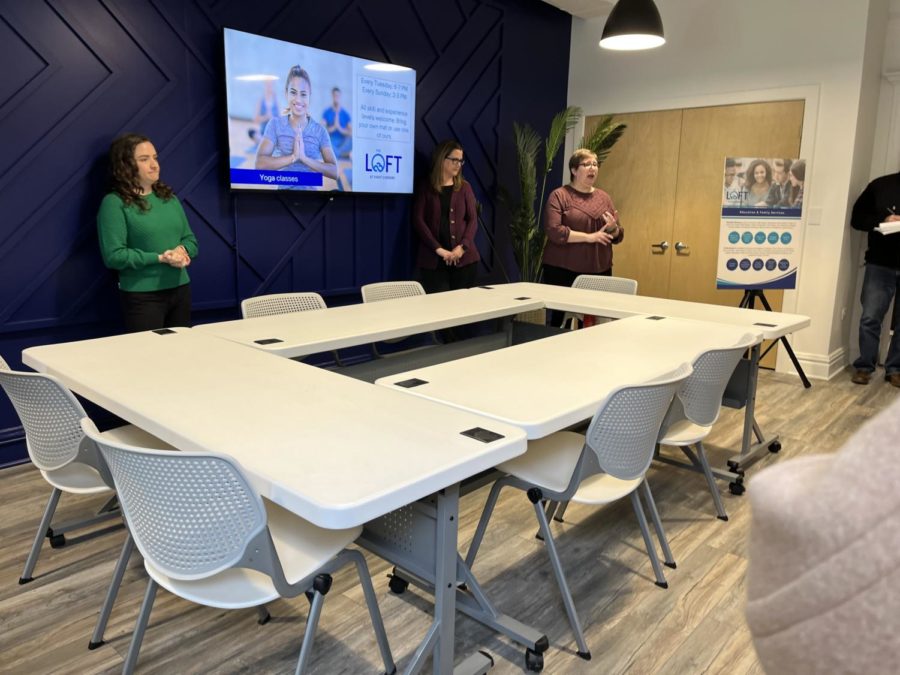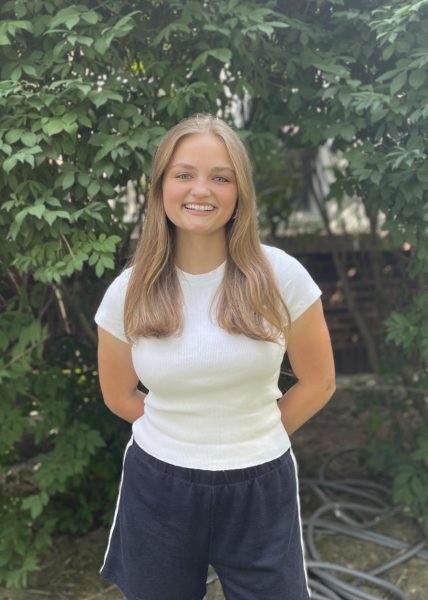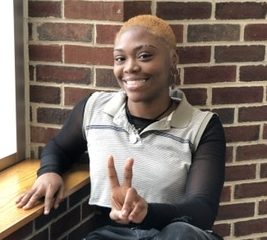“The Loft at Eight Corners” opens in Brookfield
March 13, 2023
Today, March 13th, “The Loft at Eight Corners” opened its doors, launching Brookfield’s first-ever teen-focused Mental Wellness Space. This newest addition to the Riverside Brookfield community has come as a result of a collaboration between non-profit organizations National Alliance on Mental Illness (NAMI) Metro Suburban and Pillars Community Health.
The objective of “The Loft at Eight Corners” is to educate, engage, and support youth mental health within the western suburbs of Chicago, including the Riverside Brookfield community. With mental health in teens on the decline, this program has made its debut at a crucial time.
“There are all sorts of statistics that are really kind of jaw-dropping out there around teen and youth mental health,” Associate Executive Director of NAMI Metro Suburban Shelly Lustrup said. “About 44% of youth are saying that they’ve experienced symptoms of depression or anxiety, and just under 60% of youth have [not] sought help or treatment for some type of mental health condition.”
The number of teens not seeking support for their struggles was a driving factor in the creation of “The Loft”. They aim to offer a communal space for teens looking to learn more about their mental health and give them and their families resources to feel empowered when it comes to their mental well-being.
“I just feel proud because now we have another ally, a partner, that can help students and families overcome mental health challenges. I am just elated that there’s another organization in the community that is going to be supporting the very same students that attend RB and I’m sure other schools as well. I’m excited. I am proud, and it feels good. It’s a good feeling,” Riverside Brookfield High School Principal Hector Freytas said.
Pillars Community Health and NAMI Metro Suburban joined forces to bring this program to fruition due to their long-standing partnership and aligning goals and values.
“Pillars community health is really well known for a lot of its behavioral health services, and NAMI is really well known for our peer support services. And so, kind of marrying those two together in this program is what was really inspiring us to create something,” Lustrup said.
“The Loft”’s interprofessional team consists of Mental Health Professionals, Family Support Specialists, and Recovery Support Specialists. The role of Family Support Specialists is to support family members of teens going through mental health instability and provide them with helpful resources. The Recovery Support Specialists are part of what makes “The Loft” unique from other mental health facilities.
“It’s not like a clinical therapy session. It’s just talking to a young adult who has a mental health diagnosis and is living well in recovery. They can help somebody if it’s just listening, venting, problem-solving, goal planning, or whatever it may be,” Lustrup said.
This peer-to-peer structure helps build rapport among teens and specialists and removes an unwanted power dynamic within mental health conversations.
“The recovery support specialist can disclose certain things about their own recovery whereas, in a clinical relationship, you are going to have a lot less self-disclosure,” Lustrup said.
“The Loft” also provides communal activities such as yoga classes and topical discussions.
“I can see myself utilizing something like this. I know that I sometimes have issues with feeling overwhelmed. This seems like something that could be very useful. If not someone like me using this, I would definitely, just based off of first impressions, I would definitely recommend that to some friends that I know also feel similar, like overwhelmed,” RB junior and mental health advocate Dayne Olson said.
The month of March has a packed schedule of activities on topics ranging from mindfulness to self-care.
“I think it’s a good thing for someone to pause, get their thoughts together, and just examine their being, and prioritize what’s important,” Freytas said. “I recommend that every student take advantage of it. I mean science says that there are benefits to practicing yoga and meditation. There are physical benefits, there are mental benefits, [and] there are spiritual benefits.”
A Teen Advisory Council made up of students from Proviso East, Proviso West, and RB helped give insight on what would make “The Loft” as effective for teens as possible.
“That was something they said, ‘Yeah it’s cool to like have a spot where I could talk to somebody, but also somewhere I could do a class’. A lot of what we did has all been informed by that Teen Advisory Council,” Lustrup said.
When entering “The Loft” to take part in one of their classes or to talk one on one with a specialist, you can expect to take a brief standardized evidence-based screening.
“If they are found in like a medium or high-risk category, they would immediately talk to a clinician who would do a further risk assessment,” Lustrup said.
“The Loft” program follows the national Living Room Program (LPR) model, catering to individuals in need of mental health crisis intervention with services and support diverging from hospitalization. Services provided at “The Loft” are free of charge, available 365 days a year, and offered in both English and Spanish.
“It’s not like mental health has or cares about cultural barriers or language barriers, so I think that that’s very good that they’re doing that,” Olson said. “For low-income families, again, it’s very vital. People—especially people that aren’t getting by as easily or people that are on a lower income—they’re already kind of going to be putting up with those struggles. I think, if anything, those people need these services to be accessible, especially if they’re barred from them. They don’t really have anywhere else to go. So that’s perfect.”
Olson finds it crucial to emphasize the role that organizations like this play and the positive influence they serve in an individual’s mental health journey.
“I really want to underscore the importance of programs like this. It really makes a massive difference in people’s lives. And that should not under any circumstances be underestimated just how major of a thing it is. Even if it doesn’t seem like it’s major to you, there are some people out there that could be really struggling and this could be essentially a turning point. This could be what dictates how they’re going to live their life,” Olson said.
Along with the numerous benefits for teens and their families, “The Loft” will allow RB to expend resources on different areas.
“Having advocates and specialists there for our community is going to allow us here at RB to reallocate our time to work with other situations that require it. They are going to help us become more effective,” Freytas said.
“The Loft”’s influence on the Riverside Brookfield community is only effective if teens recognize it as the asset that it is.
“You should not feel embarrassed or ashamed of getting help [or] of talking to others about mental health crises. It’s okay, and it’s good for you and for your situation. I hope this place is busy, and I’m assuming they are going to be busy,” Freytas said. “I hope people don’t feel any shame or stigma in going to get help, you know. Help is a good thing, and ‘The Loft’ is going to be there for you, for students.”



